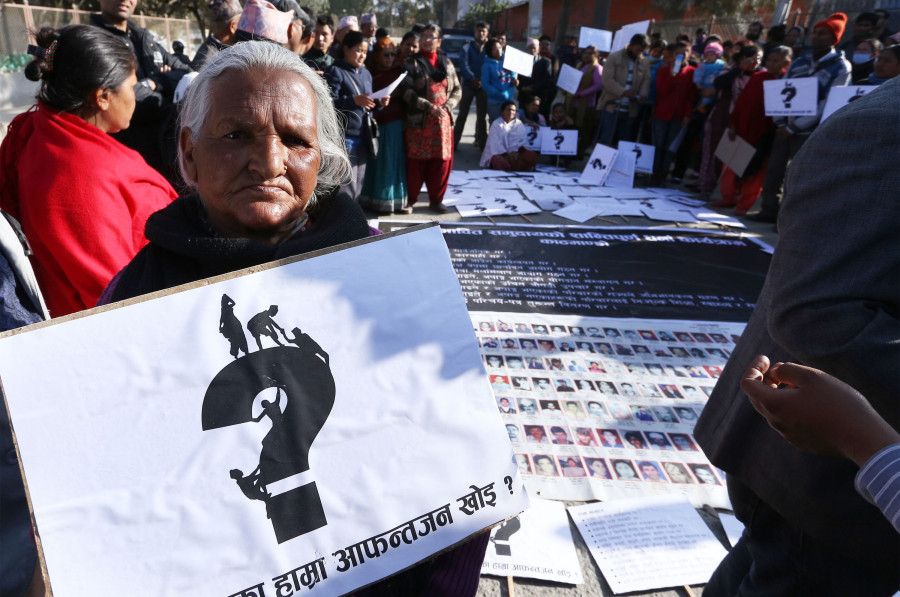National
Conflict victims oppose plan to amend transitional justice act based on a draft they rejected a year ago
As the political parties do not appear serious about ensuring justice, their actions will only promote impunity, conflict victims say.
Binod Ghimire
Following continuous pressure from conflict victims, the international community and human rights organisations, the government is finally ready to amend the transitional justice act and appoint officials to the two transitional justice commissions. But if an agreement between the two major parties—the Nepal Communist Party and Nepali Congress—is anything to go by, the long-awaited appointment will likely be met with fierce criticism.
According to leaders familiar with the agreement, the parties are preparing to revive an old draft, which was rejected by conflict victims a year ago, to amend the transitional justice act.
The Nepal Communist Party and the Nepali Congress on Wednesday decided to collect feedback from all concerned parties, based on the draft that was made public in June last year. Leaders present at Wednesday’s meeting said that consultations would be held in all seven provinces and in Kathmandu, and that the draft would be finalised after incorporating feedback. The international community too will be invited for a consultation, according to the leaders.
“The parties on Wednesday decided to collect feedback based on the same zero draft,” a senior government official who is closely involved with the transitional justice process told the Post. “The draft can be completely modified as well, but it will depend on comments and feedback from concerned parties.”
But victims of the decade-long Maoist “people’s war”, in which more than 13,000 people died and thousands were disappeared, remain unconvinced.
“It is meaningless to hold consultations on a draft that we rejected,” said
Gita Rasailee, chairperson of the Conflict Victims’ National Network. “The government and the major parties are talking about consultations just to show the international community that they are working.”
The draft, which was made public by then minister for law and justice Sher Bahadur Tamang, primarily focuses on reconciliation at the cost of legal prosecution. It proposes community service instead of jail terms for perpetrators.
The draft was prepared under the leadership of then attorney general Agni Kharel. Advocate Hari Phuyal, Nepali Congress leaders Radheshyam Adhikari and Ramesh Lekhak, and former Maoist leader Khimlal Devkota were also involved in the drafting.
Though the draft was prepared with a motive to endorse it through Parliament, the government backtracked after conflict victims and human rights organisations expressed serious reservations. They were particularly unhappy with a provision that said if a person cooperates in the investigation process and reveals facts, they would be considered for a significant reduction in penalty. Another provision said that no criminal law would be attached to war-era cases of human rights violations.
The draft was prepared three years after the Supreme Court, in 2015, struck down a dozen provisions of the Enforced Disappearances Enquiry, Truth and Reconciliation Commission Act-2014, saying that they were inconsistent with transitional justice norms and practices as they supported amnesty. The 22-page draft has proposed changes in a majority of 42 clauses of the Act.
Conflict victims and the international community have long been saying that the Nepal government must amend the Act in line with the 2015 Supreme Court order and international obligations. But a lack of political will and the Nepal Army’s reservations have resulted in a stalemate, depriving conflict victims of justice even more than a decade after the Comprehensive Peace Agreement.
Conflict victims have also opposed Wednesday’s agreement between the two parties to select officials for the Truth and Reconciliation Commission and Commission for Investigation on Enforced Disappeared Persons as per their convenience, without holding broader consultations.
The National Human Rights Commission on Thursday also said that the parties had infringed upon the jurisdiction of a committee formed under former chief justice Om Prakash Mishra. In a strongly worded statement, the constitutional watchdog has asked that the five-member recommendation committee be allowed to select leadership. “The commission might have to reconsider its representation in the recommendation committee,” read the statement.
Human Rights Commission’s member Prakash Osti is a member on the Mishra-led committee.
The Conflict Victims Common Platform has said Wednesday's agreement regarding the amendment and the appointments lay bare the ill intention of the parties to deny justice to victims and promote impunity.
“The so-called agreement between the political parties goes against the understanding that transitional justice commissions must be established through a fair, independent and transparent process,” read a statement from the platform, an umbrella body of organisations advocating for justice.
“The series of actions by the parties shows they don’t care about justice for victims,” said Rasailee of the platform.




 11.12°C Kathmandu
11.12°C Kathmandu














